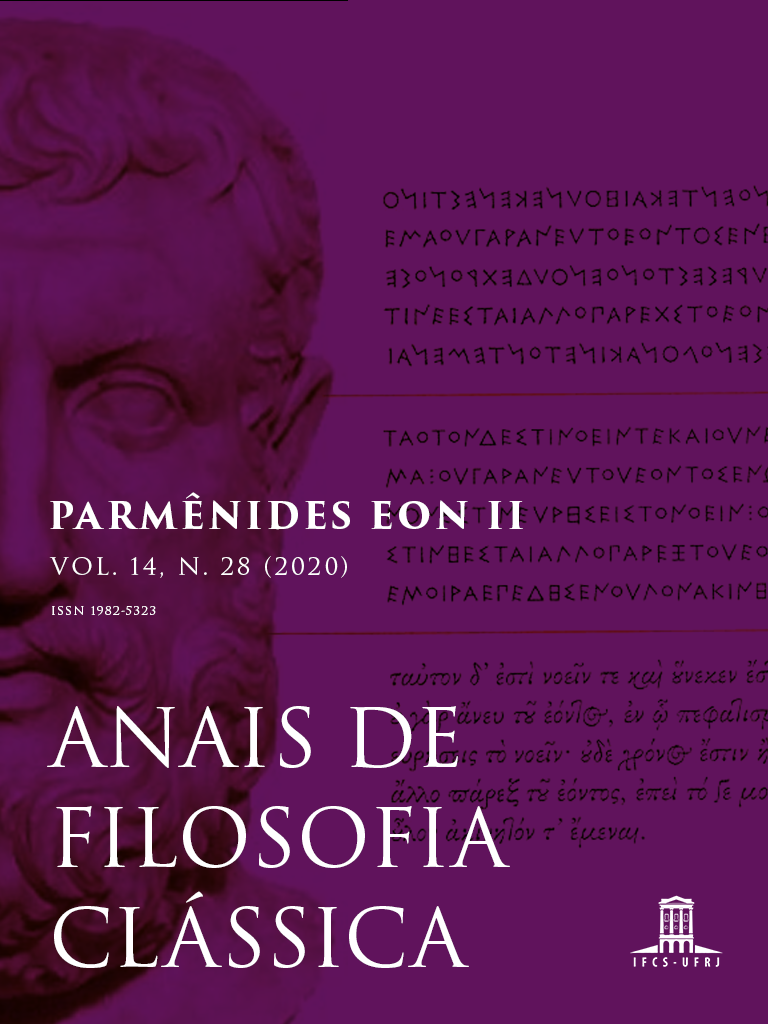Samian Meontology. On Melissus, Non-Being, and Self-Refutation
DOI:
https://doi.org/10.47661/afcl.v14i28.38769Palabras clave:
Melissus, Parmenide, Non-Being, MeontologyResumen
It is traditionally – and with reason – attributed to Melissus an absolute kind of monism, which we do not even recognize in his alleged master, Parmenides. For Melissus, there is only a unique, infinite, eternal, homogeneous and unchangeable entity. On this point, there is an almost unanimous consensus among scholars. This implies that nothing else exists except this one entity, and therefore that our physical world, the objects of our experiences, do not exist. Everything we know and talk about is not real. There are some passages in Melissus’ fragments that make this anti-Parmenidean consequence explicit.
This means that monistic ontology generates, like a shadow, a vast ‘meontology’ that surrounds every human naturalistic discourse, every theory about the world and therefore every possible object of knowledge (except for one). This, however, hides a problem of no small importance: among the non-existent things assumed by this doctrine there are, indeed, even the humans, and so the philosopher himself, Melissus, and his book, and any human thought or speech. This would seem to make Melissus’ doctrine self-refuting, denied by the very existence of the doctrine itself and of the one who proposes it, as well as by the experience of those who learn it. The difficulties inherent in strict monism have led not only to reassume the traditional critical judgments on Melissus’ philosophy (dating back at least to Aristotle) but also, in recent times, to believe that he was not a serious philosopher, rather an eristic thinker.
In this essay, I propose to examine the dark side of Melissean ontology, his discourse on non-being, and to demonstrate not only how his doctrine – in Melissus’ perspective – could escape the risk of self-refutation, but also that there is no compelling evidence that proves he should not be taken seriously.
Citas
Barnes, J. (1979), Parmenides and the Eleatic One, Archiv für Geschichte der Philosophie, 61, 1-21.
Barnes, J. (1982), The Presocratic Philosophers, London (1st ed. 1979).
Bergk, T. (1843), Commentatio de Aristotelis libello de Xenophane, Zenone et Gorgia, Marburg (then in Kleine philologische Schriften, II. Band, hrsg. von R. Peppmüller, Halle 1886, 91-111).
Bredlow, L.A. (2018), Parménides, edición crítica, versión rítmica y paráfrasis de los fragmentos del poema por A. García Calvo, editadas con prolegómenos, comentario y texto de las fuentes y los testimonios indirectos por L.A. Bredlow, Zamora.
Brémond, M. (2017), Lectures de Mélissos, édition, traduction et interprétation des témoignages sur Mélissos de Samos, Berlin-Boston.
Burnet, J. (1892), Early Greek Philosophy, London-Edinburgh.
Calogero, G. (1977), Studi sull’eleatismo, Firenze (1st ed. Roma 1932).
Cordero, N.-L. (1999), Una tragedia filosófica: del ‘se es’ de Parménides al Ser-Uno de Meliso, Revista Latinoamericana de Filosofía, 25, 283-293.
Curd, P. (1993), Eleatic Monism in Zeno and Melissus, Ancient Philosophy, 13, 1-22.
Galgano, N. (2009), A transgressão de Melisso: o tema do não-ser no eleatismo, Dissertação de mestrado, Universidade de São Paulo.
Galgano, N. (2019), From Parmenides’ to mē eon to Melissus’ to mēden, Organon, 51, 5-22.
Gallop, D.A. (1984), Parmenides of Elea. Fragments. A Text and Translation with an Introduction, Toronto.
Harriman, B. (2019), Melissus and Eleatic Monism, Cambridge.
Laks, A. – Most, G.W. (2016), Early Greek Philosophy, vol. V, Cambridge MA–London.
Loenen, J.H.M.M. (1959), Parmenides, Melissus, Gorgias. A Reinterpretation of Eleatic Philosophy, Assen.
Mackenzie, M.M. (1982), Parmenides’ Dilemma, Phronesis, 27, 1-12.
Mansfeld, J. et al. (2016), Melissus between Miletus and Elea, Eleatica 5, a cura di M. Pulpito, Sankt Augustin.
Matson, W.I. (1980), Parmenides Unbound, Philosophical Inquiry, 2, 345-360.
Matson, W.I. (1988), The Zeno of Plato and Tannery Vindicated, La Parola del Passato, 43, 312-336.
Mourelatos, A.P.D. (1965), The Real, Appearances and Human Error in Early Greek Philosophy, The Review of Metaphysics, 19, 346-365.
Obertello, L. (1984), Melissus of Samos and Plato on the Generation of the World, Dionysius 8, 3-18.
Pabst, A. (1889), De Melissi Samii Fragmentis, Bonn.
Palmer, J. (2004), Melissus and Parmenides, Oxford Studies in Ancient Philosophy, 26, 19-54.
Palmer, J. (2009), Parmenides and Presocratic Philosophy, Oxford.
Piergiacomi, E. (2020), Non di sola ontologia. Melisso e la logica delle apparenze?, in L. Rossetti et al., La filosofia virtuale degli Eleati, Eleatica 8, a cura di N. Galgano, S. Giombini, F. Marcacci, Baden-Baden.
Pulpito, M. (2011), Parmenides and the Forms, in N.-L. Cordero (ed.), Proceedings of the Inter-national Symposium: ‘Parmenides, Venerable and Awesome’ (Plato, Theaetetus 183e), Las Vegas, 191-212.
Pulpito, M. (2016a), Lo Straniero di Samo, in Mansfeld (2016), 9-67.
Pulpito, M. (2016b), Udire suoni o ascoltare parole? Un commento a Mansfeld su DK 30 B8, in Mansfeld (2016), 157-164.
Pulpito, M. (2017), On the Incipit of Melissus’ Treatise, in C. Vassallo (ed.), Physiologia. Topics in Presocratic Philosophy and its Reception in Antiquity, Trier, 77-103.
Pulpito, M. (2018), Melisso critico di Parmenide: una rivalità mimetica, Archai, 22, 17-40.
Rapp, C. (2013), Melissos von Samos, in D. Bremer, H. Flashar, G. Rechenauer (eds.), Ueberweg - Grundriss der Geschichte der Philosophie, Philosophie der Antike, vol. 1: Frühgriechische Philosophie, Basel, 573-598.
Reale, G. (1970), Melisso. Testimonianze e frammenti, Firenze.
Sedley, D. (1982), Two Conceptions of Vacuum, Phronesis, 27, 175-193.
Sedley, D. (1999), Parmenides and Melissus, in A.A. Long (ed.), The Cambridge Companion to Early Greek Philosophy, Cambridge, 113-133.
Solmsen, F. (1969), The ‘Eleatic One’ in Melissus, Mededelingen der Koninklijke Nederlandse Akademie van Wetenschappen, Afd. Letterkunde, 32, 221-233.
Taylor, C.C.W. (1999), The Atomists, Leucippus and Democritus: Fragments. With translation and commentary, Toronto.
Vitali, R. (1973), Melisso di Samo: sul mondo o sull’essere. Una interpretazione dell’eleatismo, Urbino.


